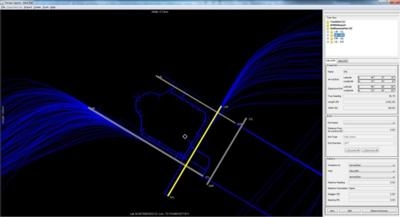Sat, Jan 03, 2015
Software Simulates Arriving And Departing Traffic To Assist In Runway Assignments And Sequencing
For several years, the FAA has used the results of an airport capacity tool called the runwaySimulator model that was developed by MITRE to efficiently evaluate an airport’s capacity.

The tool is now being made publicly available to those with interests in aviation and airport planning. The tool can be used to assess an airport’s existing capacity, as well as capacity improvements with new infrastructure or flight procedures.
The runwaySimulator model simulates arriving and departing traffic at an airport, the decisions made about runway assignment and sequencing, and the flight operations themselves. The model generates a randomized traffic sample that keeps pressure on the airport. The traffic sample reflects an airport's mix of aircraft types, which differ in their performance parameters.
FAA separation standards are codified in the software as rules that govern pairs of flight operations, and these are modified to represent common pilot and controller behaviors. The runway configuration is set and exceptions noted to prohibit use of specified runways by certain aircraft types or to set aside runways for exclusive use by, say, general aviation traffic. A heuristic algorithm assigns runways and sequences traffic to balance efficiency and delay while respecting separation requirements and runway eligibilities.
When used to estimate capacity, runwaySimulator generates traffic so there is constant demand on the runway system. It does this for various arrival-departure mixes and, for each, simulates steady-state operations for several hundred hours. The average throughput achieved is recorded for each arrival-departure mix and used to create the airport's capacity "curve" (i.e., a Pareto frontier). The model provides a variety of measurements and visualizations to the analyst to verify and validate the simulation.
The tool can be used to estimate runway capacity with current and future operations. However, runwaySimulator does not evaluate most non-runway constraints at the airport nor limitations elsewhere in the national airspace system. Such constraints may include taxiway or gate constrains, terminal airspace congestion, Air Traffic Control traffic management initiatives, and seasonal limitations due to high temperatures that restrict aircraft climb rates.
(Runway simulator screenshot provided by the FAA)
More News
“We respectfully call on the City of Mesa to: 1. Withdraw the landing fee proposal immediately 2. Engage with the aviation community before making decisions that impact safet>[...]
High Speed Taxiway A long radius taxiway designed and provided with lighting or marking to define the path of aircraft, traveling at high speed (up to 60 knots), from the runway ce>[...]
Aero Linx: International Federation of Airworthiness (IFA) IFA uniquely combines together all those with responsibility for policies, principles and practices concerned with the co>[...]
Controller’s Expectation That VW02 Would Have Departed Sooner Led To An Inadequate Scan And Loss Of Situational Awareness Analysis: A Robinson R-44 helicopter N744AF, VW02 (V>[...]
A Few Questions AND Answers To Help You Get MORE Out of ANN! 1) I forgot my password. How do I find it? 1) Easy... click here and give us your e-mail address--we'll send it to you >[...]
 Aero-News: Quote of the Day (12.09.25)
Aero-News: Quote of the Day (12.09.25) ANN's Daily Aero-Term (12.09.25): High Speed Taxiway
ANN's Daily Aero-Term (12.09.25): High Speed Taxiway ANN's Daily Aero-Linx (12.09.25)
ANN's Daily Aero-Linx (12.09.25) NTSB Final Report: Diamond Aircraft Ind Inc DA20C1 (A1); Robinson Helicopter R44
NTSB Final Report: Diamond Aircraft Ind Inc DA20C1 (A1); Robinson Helicopter R44 ANN FAQ: Q&A 101
ANN FAQ: Q&A 101



